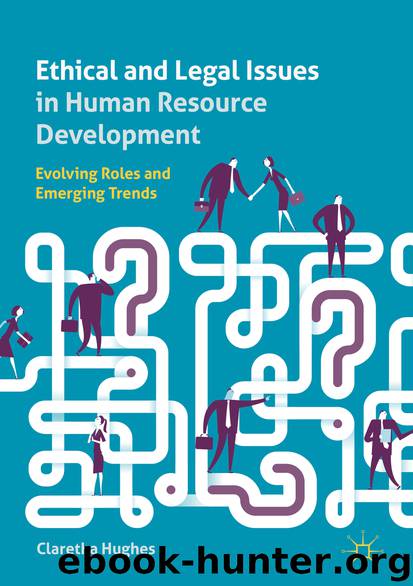Ethical and Legal Issues in Human Resource Development by Claretha Hughes

Author:Claretha Hughes
Language: eng
Format: epub
ISBN: 9783319995281
Publisher: Springer International Publishing
Leaders not only fail to communicate effectively with protected class employees, but they also reveal through their actions that they are not supportive. Nonsupportive behaviors are often referred to as aversive racism (Kovel, 1970). “Aversive racists, in comparison, sympathize with victims of past injustice, support the principle of racial equality, and regard themselves as nonprejudiced, but, at the same time, possess negative feelings and beliefs about Blacks, which may be unconscious” (Gaertner & Dovidio, 2005, p. 618). Gaertner and Dovidio (2005) found that “When interracial interaction is unavoidable, aversive racists experience anxiety and discomfort, and consequently they try to disengage from the interaction as quickly as possible” (p. 18). Amodio (2009) found that interracial anxiety impedes an individual’s ability to control behaviors of racial stereotypes toward minorities. Aversive behaviors can also be influenced by opinions on how disadvantaged a person may or may not be. In disability discrimination, people will attempt to diagnose the degree of the person’s disability and form opinions based on their personal biases. Chan, McMahon, Cheing, Rosenthal, and Bezyak (2005) discovered that people tend to be more discriminatory against those who have what is perceived to be self-inflicted disabilities such as alcoholism, AIDS, and mental illness versus those who were born disabled. The underlying belief that a disabled individual is not worthy of pity is also a form of aversive discrimination. Believing that an individual is not truly disabled or worthy of federally required special accommodations can diminish the individual’s opportunity to succeed and advance at work and lead to a legal case against the employer and the leader.
It is difficult to image that leaders who are aversive racists can be effective leaders of protected class groups in the workplace without DQ and diversity and ethics training. One cannot lead what one does not understand and support (Hughes & Brown, 2018). Until leaders’ and employees’ thoughts and actions toward each other improves without having to be told to do so for legal and ethical reasons, there is always room for interpersonal relationship improvement. HRD professionals must continuously consider if they are competent to provide the needed ethics (Keep, 2007) and diversity training for their trainees and organization. HRD professionals must help organizations see a return on investment through diversity training through the realized goals, which align with organization goals, of protected class employees in the workplace.
Download
This site does not store any files on its server. We only index and link to content provided by other sites. Please contact the content providers to delete copyright contents if any and email us, we'll remove relevant links or contents immediately.
The Brazilian Economy since the Great Financial Crisis of 20072008 by Philip Arestis Carolina Troncoso Baltar & Daniela Magalhães Prates(104756)
International Integration of the Brazilian Economy by Elias C. Grivoyannis(74552)
The Art of Coaching by Elena Aguilar(52173)
Flexible Working by Dale Gemma;(23210)
How to Stop Living Paycheck to Paycheck by Avery Breyer(19562)
The Acquirer's Multiple: How the Billionaire Contrarians of Deep Value Beat the Market by Tobias Carlisle(12098)
Thinking, Fast and Slow by Kahneman Daniel(11781)
The Radium Girls by Kate Moore(11616)
The Art of Thinking Clearly by Rolf Dobelli(9908)
Hit Refresh by Satya Nadella(8851)
The Compound Effect by Darren Hardy(8504)
Atomic Habits: Tiny Changes, Remarkable Results by James Clear(8043)
Tools of Titans by Timothy Ferriss(7807)
Turbulence by E. J. Noyes(7696)
Change Your Questions, Change Your Life by Marilee Adams(7371)
A Court of Wings and Ruin by Sarah J. Maas(7249)
Nudge - Improving Decisions about Health, Wealth, and Happiness by Thaler Sunstein(7238)
How to Be a Bawse: A Guide to Conquering Life by Lilly Singh(7154)
Win Bigly by Scott Adams(6823)
